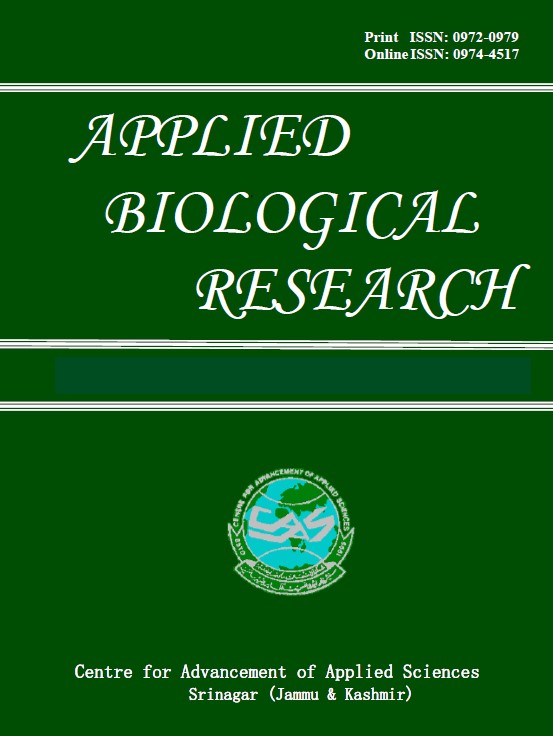Genetic Diversity Analysis And Dna Fingerprinting Of Elite Stock Of Gladiolus (Gladiolus Hybridus Hort.) Using Issr Markers
DOI:
https://doi.org/10.48165/Keywords:
Gladiolus, genetic diversity, ISSR markersAbstract
Molecular characterization of 48 genotypes of gladiolus was carried out using PCR based ISSR technique. A total number of 239 loci were generated out of which 216 loci ranging in size of 200 to 1000 bps were found polymorphic (90.38% polymorphic bands). The PIC value of primers ranged from 0 to 0.22 with mean value of 0.15 primer-1 and most informative marker was related to UBC 853 followed by UBC 859. Based on banding pattern, the cluster analysis was done using UPGMA and dendrogram was constructed. The similarity coefficient ranged from 0.34 to 0.74 based on dissimilarity matrix. The dendrogram grouped the genotypes into 3 main groups with group I and II having maximum number of genotypes. The pattern of genotype grouping into clusters was independent of their eco-geographical regions and gave a useful insight into their phylogenetic relationships. Analysis of molecular variance (AMOVA) indicated that maximum genetic diversity was partitioned within groups (84%) and only 16% of total variation occurred between the groups. The phylogenetic relationship was determined by principal co-ordinate analysis (PCoA) that explained 23.41% cumulative variance. PCoA revealed similar clustering pattern of genotypes along the axis, thereby corroborating the clustering of genotypes in UPGMA dendrogram.
Downloads
References
Agarwal, P.K. and Srivastava, A. 2010. Assessment of genetic diversity among chickpea cultivars of India using RAPD markers. Indian Journal of Genetics, 70: 264-270.
Anderson, J.A., Churchill, G.A., Autrique, J.E., Tanksley, S.D. and Sorrells, M.E. 1993. Optimizing parental selection for genetic-linkage maps. Genome, 36: 181-186.
Baliyan, D., Sirohi, A., Kumar, M., Kumar, V., Malik, S., Sharma, S. and Sharma, S. 2014. Comparative genetic diversity analysis in chrysanthemum: A plot study based on morphs agronomic traits and ISSR-markers. Scientia Horticulture, 167: 164-168.
Chen, J.Y. 2001. Cultivars and Classifications of Flowers of China (M). Chinese Forestry Press, Beijing, China.
Doyle, J.J. and Doyle J.L. 1990. A rapid total DNA preparation procedure for fresh plant tissue. Focus, 12: 13-15.
Godwin, I.D., Aitken, E.A.B. and Smith, L.W. 1997. Application of inter simple sequence repeat (ISSR) markers to plant genetics. Electrophoresis, 18: 1524-1528.
Jingang, W., Ying, G., Daidi, C., Shenkui, L. and Chuapin, Y. 2008. ISSR analysis of 26 species in Gladiolus hybridus Hort. Journal of Northeast Agricultural University, 15(4): 6-10. Khar, A., Devi, A.A. and Lawande, K.E. 2008. Analysis of genetic diversity among Indian garlic (Allium sativum L.) cultivars and breeding lines using RAPD markers. Indian Journal of Genetics, 68: 52-57.
Kiani, M., Memariani, F. and Zarghami, H. 2012. Molecular analysis of species of Tulip L. from Iran based ISSR markers. Plant Systematics and Evolution, 298: 1515-11522. Kumar, P., Kumar, M., Naresh, R.K., Kumar, N., Chaudhary, P. And Sharma, S. 2016. Evaluation of genetic diversity in gladiolus (Gladiolus hybridus Hort.) germplasm using ISSR markers. International Journal of Agricultural and Statistical Sciences, 12: 277-283.
Lessa, E.P. 1990. Multidimensional analysis of geographic genetic structure. Systematic Zoology 39: 242-252.
Nan, P., Peng, S., Shi, S., Ren, H., Yang, J. and Zhong, Y. 2003. Interpopulation congruence in Chinese Primula ovalifolia revealed by chemical and molecular markers using essential oils and ISSRs Zeitschrift für Naturforschung. Journal of Biosciences, 58: 57-61.
Peakall, R. and Smouse, P. 2012. GenAlEx 6.5: Genetic Analysis in Excel. Population genetic software for teaching and research - An update. Bioinformatics, 28: 2537-2539. Perrier, X. and Jacquemoud-Collet, J.P. 2006. DARwin Software [http://darwin.cirad.fr/darwin].
Zahoor Ahmed et al.
Raycheva, T., Stoyanov, K. and Denev, I. 2011. Genetic diversity and molecular taxonomy study of three genera from Iridaceae family in Bulgarian flora based on ISSR markers. Biotechnology and Biotechnological Equipment, 25: 2484-2488.
Sangwan, R.S., Sangwan N.S., Jain, D.C., Kumar, S. and Ranade, A.S. 1999. RAPD profile based genetic characterization of chemotypic variants of Artemisia annua L. Biochemistry and Molecular Biology International, 47: 935-944.
Shufang, G., Huijuan, F.U. and Jingang, W. 2010. ISSR analysis of M1 generation of Gladiolus hybridus Hort. Treated by EMS. Journal of Northeast Agricultural University, 17: 22-26. Singh, N., Ashish, K.P., Roy, R.K., Tewari, S.K., Tamta, S. and Rana, T.S. 2017. Assessment of genetic variation and population structure in Indian gladiolus cultivars inferred from molecular markers. The Nucleus, 59: 235-224.
Sirohi, U., Kumar, M., Chauhan, P., Kumar, N., Prakash, S., Chand, P., Naresh, R.K., Sharma, R. and Chaudhary, V. 2017. Genetic diversity in tuberose (Polianthus tuberose L.) germplasm using inter simple sequence repeats (ISSR) markers. International Journal of Current Microbiology and Applied Sciences, 6: 1313-1321.
Zhao, L., Liu, L., Cai, G. and Xia, M. 2014. Assessment of genetic diversity and genetic relationship of lilium in China using ISSR markers. Biochemical Systematics and Ecology, 55: 184-189.
Zietkiewicz, E., Rafalski, A. and Labuda, D. 1994. Genome fingerprinting by simple sequence repeat (SSR): Anchored polymerase chain reaction amplification. Genomics, 20: 176-183.

